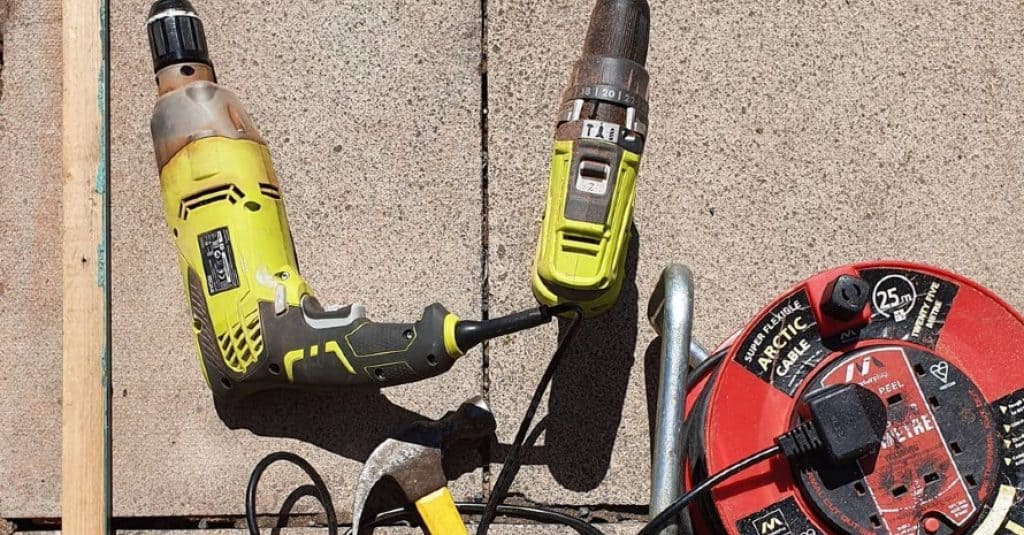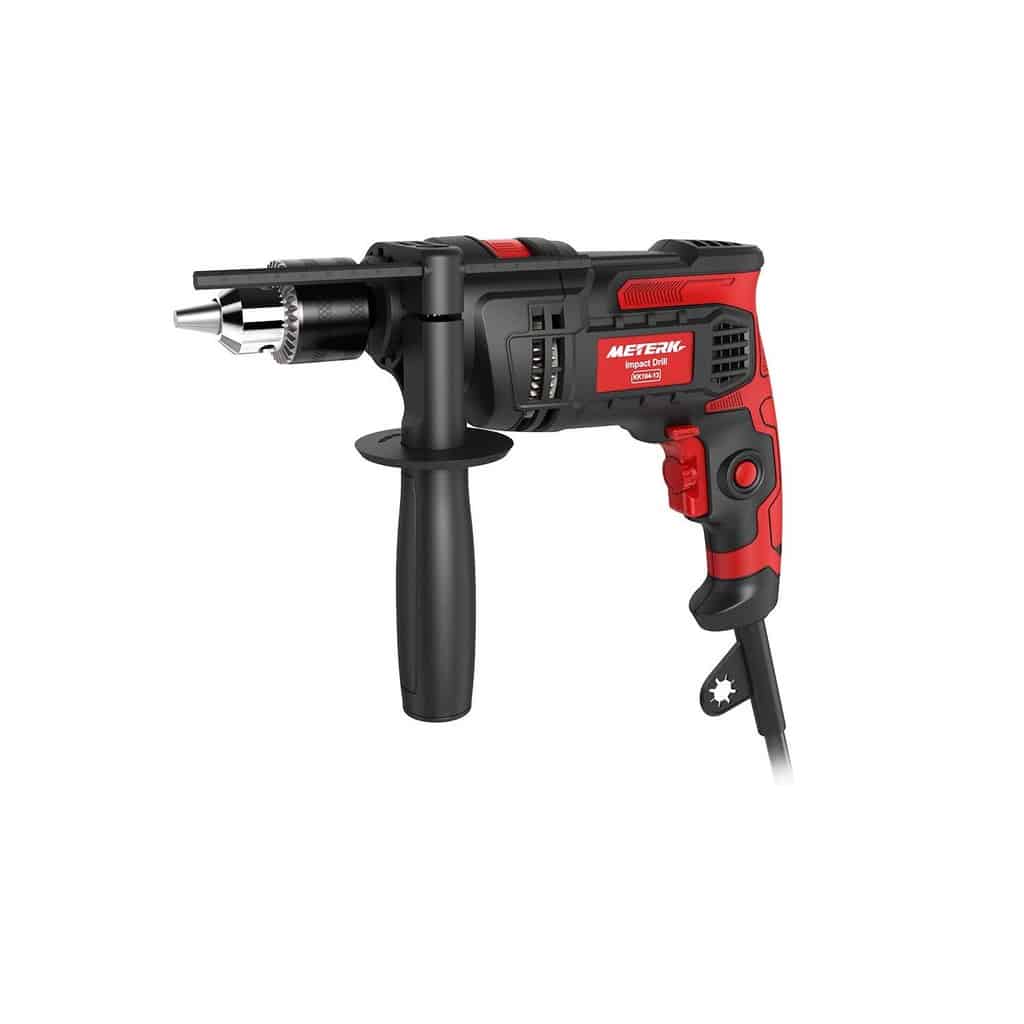Corded Vs Cordless Drill: Which Option to Choose?
The cordless vs corded drill debate has been around for a long period. What most people do not understand is that no drill is better than the other. Each tool is great for a specific project. The main difference between these two types of drills is their convenience and power.
While cordless drills are more handy to move around, the corded drills generate more power for hard projects.
It’s essential to understand the characteristics of each device to determine which one will fit your job best. In this review, I will discuss the specifics of each drill, their specifics, and for what projects you can utilize a particular model to receive the right results.
The main difference between a corded and cordless drill is that a corded drill is powered by an electrical cord, while a cordless drill is powered by a battery. Corded drills are generally more powerful than cordless drills, but they are also heavier and more difficult to maneuver.
Contents
The Pros and Cons of a Corded Drill

Let’s start with the corded models. Below are some of the advantages and pitfalls associated with corded drills.
A reliable source of power
Corded drills are connected to a continuous power source, meaning they give a consistent and greater torque. As a result, you won’t be concerned about a poor performance of the device midway through a task due to drained batteries.
Also, with corded drills, you are not limited in the voltage options. You can use your desired voltage from the beginning to the end, meaning for as long as your job takes. It makes these devices much more reliable than their cordless counterparts.
Thanks to their continuous and reliable power supply, corded drills are often used for tasks that take many hours to complete. If you opt for a cordless drill in such cases, you would probably run out of battery before you finish. Also, since corded drills have greater torque and high voltage, they pose as ideal equipment when working on hard materials like metals or glass.
Lightweight
When discussing corded vs cordless drill models, weight is a distinguishing factor. Usually, corded drills are more lightweight compared to cordless tools, as cordless drills have bulky and heavy batteries that add to their weight.
The lightweight nature of the corded devices makes them the preferred choice for tasks that will take you long hours to complete. Since they are ultra-portable, they won’t weigh down your hands, even after long hours of use.
Long lifespan
Corded drills last longer because you don’t have to worry about the battery self-destructing, even when not in use. Also, if you don’t use your equipment much, the next time you power it, a corded drill will operate optimally like the last time you switched it off.
However, there are a few things you might not like about corded drills. Here are some of them:
Restricted mobility and inconvenience
When working with a corded drill, the power cord can easily restrict your movement. And since it is connected to a power source, you are limited to work within its length. Besides, power cords can act as a tripping hazard, especially if you use an extension.
Also, you can’t operate a corded drill in sites with no supply of power. You may, thus, need to carry a generator that is usually bulky and needs extra space to be positioned.
Storage difficulties
The cords make it difficult to store corded drills, as well. You will have to be extra careful when storing such tools to prevent damage to them. You may also need additional storage equipment, like storage bins or wide shelves, to keep your corded drills safe.
The Pros and Cons of a Cordless Drill

Do you want to know the benefits of a cordless drill and when to use such a tool? Let’s look at the pros that come with this equipment first.
Portability
With cordless drills, you don’t have to depend on a secondary source of power, and, therefore, you don’t need a cord. It makes such a tool more portable and flexible.
Thanks to their versatility and portability, cordless drills make for useful backup equipment for contractors. Unlike corded drills that are ideal for heavy-duty work, cordless models are the desired option for small and easy household jobs.
Ease of storage
Besides being portable, cordless drills are easy to store. Most of these devices come with a storage container for the drill itself and its batteries. The storage container also has a space to place the impact drawers and saws.
But such tools have their drawbacks, as well. Here is why you might not like to work with a cordless drill:
Power loss
All batteries run out of power at some point. Therefore, you will have to take a break to recharge the battery or replace it with another one. Although there are self-destructing batteries available, you will anyway have to buy other costly ones to replace them. Failure to do it in time can affect your drill performance.
Bulkiness
With the attached battery comes an additional weight. Most cordless drills are fitted with lightweight lithium-ion ones, but the battery weight may vary from one tool to another, depending on the voltage you need. The more the power, the heavier the battery is. The additional battery weight may result in hand fatigue and strains after holding a tool for a long time.
FAQ: Answers to Common Questions on Cordless Vs Corded Drill Models
- Is a cordless drill as powerful as its corded counterpart?
A cordless drill can be as powerful as a corded one if you use good batteries. The power of a cordless tool largely depends on the type of battery you use. For instance, a device with a 4AH battery will give you a performance similar to that of a corded drill.
- How long should I expect a lithium battery to last?
Generally, lithium batteries have a lifespan of about two to three years. If properly managed, however, these batteries can last you longer. It is recommended to store batteries in a clean, cool, and dry place. You should also ensure they are not fully drained before storing them.
- Which tool is more durable?
Both drills are durable. However, corded drills’ reliance on direct current and the environment they operate in make them vulnerable to damages. Nonetheless, if you maintain such tools well, expect the drills to last for long. The only thing is that you’ll need to replace your lithium batteries in cordless drills.
Corded or Cordless Drill? My Verdict
There is no fit-it-all drill. The choice on a corded or cordless tool will depend on your preferences and work needs. Each device type has its pros and cons, so compare them against the nature of your tasks and make an informed decision.
If you tend to work in places where there is no source of power, or if you always do quick household projects, then a cordless drill should be an excellent choice. On the other hand, if you need more power for massive projects and to work on hard materials, like metal, then go for the corded drill.
Do you have a corded or cordless drill in your toolkit? What devices would you recommend for what tasks? Let me know about your experiences in the comments below.
“A good tool stays with you for many years and choosing carefully ensures the job is done right, your work is neat, and the tool is always a pleasure to use”






Hey, I have a quick question for you. What do you think about Dewalt drills vs Makita? Are they really that much better than something like a Ryobi? I’m planning on buying a kit and I want to make sure I’m investing in the right system. I really appreciate it!